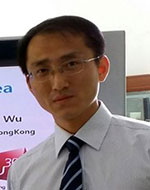


Biography: Dr. Guosong Wu is presently a professor of Hohai University (China). He received his Ph.D. in materials processing engineering from Shanghai Jiao Tong University (China) in 2007. Before he joined Hohai University, he has worked as a researcher in Chinese Academy of Sciences, City University of Hong Kong, China and Kwangwoon University (South Korea) for about 10 years. His research interests include biodegradable materials, surface engineering, corrosion science, plasma related technologies and coatings. He has published more than 70 international journal papers that have been cited over 1600 times (H-index=27) according to Google Scholars. Also, he has delivered 15 invited talks in academic conferences and 2 invited presentations in Korean universities. Now, he is working as an editorial board member for 4 international journals and a reviewer for more than 30 international journals. In 2015 and 2016, he won the ‘Outstanding Reviewer’ of the SCI Journal Corrosion Science, Vacuum and Materials Letters.
Speech Title: Composite-based surface modification of Mg alloys for controlling their corrosion
Abstract: Magnesium and its alloys are one of the lightest structural metals and have been widely used in automobile, aerospace and electronics industries because they can reduce environment pollution and fuel consumption in those applications. In addition, Mg alloys have also attracted much attention in biomedical fields due to their intriguing biodegradation. However, poor corrosion resistance in aqueous environments always impedes their further applications. Even biodegradable Mg-based implants need corrosion control to adapt the changing surrounding during the healing period. Surface modification is one of the effective ways to control the corrosion behavior of Mg alloys in aqueous environments. Here, some strategies proposed in our studies are introduced. Plasma and ion beam processes were combined in our previous research and surface alloying was introduced into the process of oxygen plasma immersion ion implantation to form chemically stable oxides such as zirconium oxide and chromium oxide in the surface oxidized layer. As expected, the corrosion resistance of the treated Mg alloys can be improved in simulated physiological environments. Also, hydrothermal method was attempted to construct a composite barrier layer on Mg alloy and a superhydrophobic behavior on Mg alloy can be acquired with a subsequent chemical modification. In our study, corrosion can be successfully mitigated with this special surface layer due to less contact with water.
Keywords: magnesium alloy; corrosion; coating; composite; surface modification